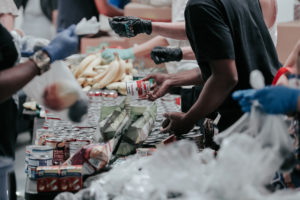A Humanist Call for Mutual Aid

The holiday season between Thanksgiving Day and New Year’s Day is traditionally a time when people think about giving back to their communities and look for opportunities to volunteer. Many humanists and humanist groups do service projects throughout the year, but especially during this time. The pandemic has made these projects somewhat harder because we can’t gather in groups so some traditional service projects, like serving food at a homeless shelter, are difficult. And the need is all the more urgent.
That’s where mutual aid comes in. The idea of mutual aid, and even the phrase itself, certainly existed before COVID. A famous example is the free-breakfast program started by the Black Panther Party that organized local people to feed tens of thousands of food-insecure children in multiple cities in the late 60s and early 70s. Other examples are childcare co-ops and relief networks that spring up in the wake of natural or human-made disasters. The pandemic, however, has renewed and intensified the practice. Basically, the idea of mutual aid is to create networks of people to provide aid to others in their neighborhood or area who are in need.
Mutual aid is based on creating direct connections between the people who need services and the individuals that can provide them. Rather than a non-profit organization deciding what services are necessary and how they are provided, people identify their needs and others, usually in their immediate community, volunteer to provide those services. During the pandemic, this often takes the form of things like connecting through a neighborhood listserv to purchase and deliver groceries for housebound neighbors, or distributing masks and hand-sanitizer to homeless people living on the streets of your community, or chipping in to purchase restaurant gift cards for essential workers who work particularly long hours and could use some take-out from the corner restaurant so they don’t have to cook dinner (which also helps keep the restaurant in business).
In March and April, the American Humanist Association developed a webinar series to help people address some of the many challenges and ethical questions presented by the pandemic by sharing how humanists across the country are taking action during COVID. The second session (held April 28th) brought together local activists and representatives from Foundation Beyond Belief to engage more humanists in mutual aid. Speakers encouraged attendees to all be activists and find ways to use their privilege to challenge barriers for people who struggle to meet their needs.
One of the speakers was Danielle Muscato, an activist who has been involved in mutual aid since 2016. She is the former Public Relations Director of American Atheists and now works with a mutual aid house in Louisville, KY. Since coming out as transgender, her activist focus has shifted from separation of religion and government to more LGBTQ civil rights and healthcare access, racial justice, labor economics, feminism, and so on. She says,
Mutual aid is more direct help, it’s faster help. The types of things that you can do in mutual aid are things that need to happen that day versus the bureaucratic element in most non-profits with a delay in funding, where you can do bigger things but it’s a slower process. Mutual aid is about solidarity, it’s not charity. Meaning it’s not necessarily people with a lot of privilege sharing with those without privilege. It’s people in a community helping each other because they understand what is needed, can make connections, and may have more skills than money. (If you’re able to write a check, that’s great and I’d encourage you to do that.)…. It’s about examining your own blind spots and asking what marginalized people need from us and need us to understand, and using your privilege to do what you can.
Muscato recommends looking for ways to participate by Googling “mutual aid” and your city, town, or community to look for efforts that are already ongoing. She also offers concrete advice for people who want to participate in mutual aid:
Don’t reinvent the wheel. Get plugged in to existing networks and ask how you can help. Find the people in your community already doing this and learn from them while you help them. Write down your skill sets and hobbyist interests (cooking, multiple languages, sewing, sharpening knives, etc.), your availability, your contact information on multiple apps and platforms, your resources (car, clothes, diapers, power tools, grocery memberships or cards, kitchen space), and any significant network connections you have to people with large social media platforms. Like a CV or resume for frontlines activism…It just takes patience, persistence, vision, strategy, passion, resourcefulness, and compassion.
Early in the pandemic, Congresswoman Alexandria Ocasio-Cortez (D-NY) spoke of the need for mutual aid when she said, “There are two ways that this can go for us. We can buy into the old frameworks of, when a disaster hits, it’s every person for themselves. Or we can affirmatively choose a different path. And we can build a different world, even if it’s just on our building floor, even if it’s just in our neighborhood, even if it’s just on our block.”
That certainly sounds like a call to action for humanists and a way to put humanist values into action. The pandemic emphasizes how important it is to pull together as communities. We need to remember these lessons even after the pandemic is over.
